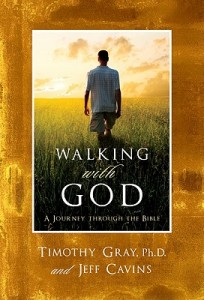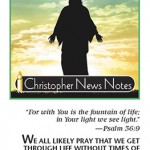 A lot of people have questions about different parts of the Bible. For instance, Isn’t Genesis just another creation myth? Why does God seem angry and vengeful in the Old Testament, but loving and merciful in the New Testament? Does Eve being created from Adam’s rib mean the Bible is saying that women are inferior to men? Why does God ask Abraham to sacrifice Isaac?
A lot of people have questions about different parts of the Bible. For instance, Isn’t Genesis just another creation myth? Why does God seem angry and vengeful in the Old Testament, but loving and merciful in the New Testament? Does Eve being created from Adam’s rib mean the Bible is saying that women are inferior to men? Why does God ask Abraham to sacrifice Isaac?
Dr. Tim Gray, the author of “Walking with God: A Journey Through the Bible,” answered some of those questions when I interviewed him on “Christopher Closeup” a while back. Dr. Gray is known for his partnership with Jeff Cavins in the popular “Great Adventure Bible Timeline” series. He is also making sacred Scripture relatable and relevant through his work as president of the Augustine Institute in Denver. Here are some excerpts from our interview:
TR: I’ve started reading more commentaries about Genesis because that’s the point where many agnostics or atheists reject Christianity, saying that the creation story of Adam and Eve has been disproved. But books like “Walking with God” demonstrate that they’re approaching the creation story with the wrong mindset. When we read that story today, what are some factors we should keep in mind?
 Tim Gray: The first thing is having a good historical and cultural handle on what we’re reading. When modern people pick it up and think in terms of science and they hear that on day one, light was created but on day four, you have the sun, the moon and the stars – they say, ‘That’s ridiculous.’ What we think of as primitive people, they weren’t that dumb. What they’ve done in the creation story is written a poem. It’s a beautiful poem that parallels the days – Day One parallels Day Four. If you understand the poetry and the parallelism that’s set up there, it changes your whole reading of the text. That’s crucial. A lot of people cynically don’t appreciate the kind of literature that Genesis One is.
Tim Gray: The first thing is having a good historical and cultural handle on what we’re reading. When modern people pick it up and think in terms of science and they hear that on day one, light was created but on day four, you have the sun, the moon and the stars – they say, ‘That’s ridiculous.’ What we think of as primitive people, they weren’t that dumb. What they’ve done in the creation story is written a poem. It’s a beautiful poem that parallels the days – Day One parallels Day Four. If you understand the poetry and the parallelism that’s set up there, it changes your whole reading of the text. That’s crucial. A lot of people cynically don’t appreciate the kind of literature that Genesis One is.
TR: There are numerous creation myths throughout history. What separates Genesis from the pack?
Tim Gray: A lot of people think of the Bible and the Christian story as just another myth. That’s not the case at all. When you really know the ancient mythologies that were going around the near East, you see that Genesis is really a polemic against the mythology of the ancient near Eastern people. For example, it’s showing you that God creates out of nothing whereas in the Enuma Elish and other near Eastern creation myths, you have a goddess getting sliced in half. The heavens are made out of one half of her body, the oceans are made out of the other half of her body. You’re at a radically different level of an account of creation from the pagans to the Israelites.
TR: One is created out of love, the other out of violence so it is a big difference.
Tim Gray: It is. That actually goes back to one of the things that struck me the most. In a lot of the creation stories in the ancient near East as well as in the Indo-European people, they thought the gods were hostile to humanity. And the gods thought the biggest problem was overpopulation. In a lot of mythology, the reason for the Trojan War is that Zeus and the gods felt that there were too many people. What you get in the creation account of the Jews is radically different. You have a God who says, “Be fruitful and multiply.” He blesses humanity, he wants them to multiply. God loves humanity. So it’s interesting when you look at some of the ancient myths and their hostility between the gods and humanity, it’s the kind of cultural problems we face today where people think there’s too many people and there’s a hostility to life.
TR: What was the pagan culture like in which the ancient Jewish people lived – and what pagan customs had incorporated their way into the Jewish lifestyle?
Tim Gray: You’ve got several. You’ve got Israel that’s coming out of Babylonian captivity but you also have Israel that’s come out of Egypt. For the Egyptians, pharaoh and his queen are children of god, made in the image and likeness of god. What the Hebrews do is show that, when God creates, he creates everybody in the imago Dei, everybody has this incredible dignity, they’re stamped with the divine imprint – and that radically changes the account. Before there was a very rare class of people who had the full privileges and rights. Now what the Hebrews have done is democratized this divine right. That’s what I think is so fascinating. When people read the Biblical story and what we’re trying to do in ‘Walking with God,’ they see this ancient story has all kinds of modern implications.
TR: God in the Old Testament seems vengeful, and sometimes even seems like He’s endorsing capital punishment and slaughter. Why do we have such a view of God in the Old Testament and why is it not really correct?
Tim Gray: There’s a lot of misconceptions about the Old Testament. First off, people tell me ‘I don’t like reading the Old Testament because it’s got all this violence and scandals and things.’ The Old Testament is messy because humanity is messy. As the Church Fathers said, God has to come down to our level and try to bring us back up. Look at the newspapers. There’s violence today, constant violence. The violence and the bloodshed in the Bible is there because that’s the way humanity is – and the Bible gives us the reason that humanity’s that way. The second thing is that there’s often a misconception of what God is doing in the Old Testament. There’s a lot of misconceptions about herem warfare for example. One of the things we try to tackle in ‘Walking with God’ is, ‘Why is there violence in the Bible and what’s God’s role in that?’ It’s much different than what most people think…
The Church Fathers had a sense of how God comes down to the level of Israel. Through better narrative analysis and through growing in wisdom, we can see a little bit more clearly. Jesus says, when they ask about divorce, He says divorce isn’t what God originally wanted. The rabbis are surprised and say ‘Why did Moses tell us we could do this?’ Jesus responds, ‘It’s the hardness of your hearts.’ That law about divorce which is in Deuteronomy is also saying that there’s things in Deuteronomy that weren’t God’s plan, that were concessions Moses allowed, now Jesus is going to tighten things up a bit.
Click here for Part 2 of the Dr. Tim Gray interview.










